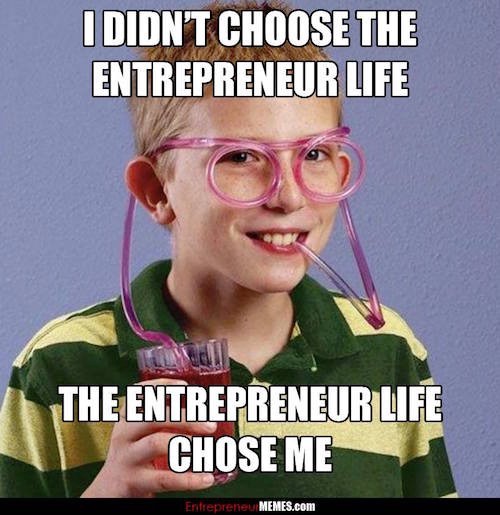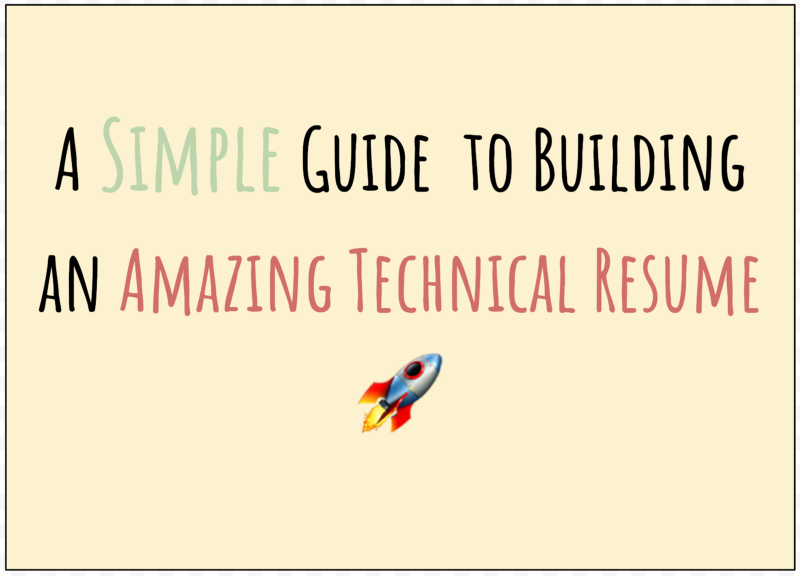Whether you’re an aspiring software engineer or a seasoned developer, there are times when you need to give your résumé a boost to make it much more appealing.
I’ve written extensively about how to write an amazing technical résumé, but today’s article is different. I want to share my insights from interviewing at multiple companies, and how you can incorporate that to make an outstanding technical résumé.
If you find this article useful, make sure you leave a ? down below! (And please come check out my newly launched website that I’m super thrilled about! I’m extremely proud because a student of mine built it :) )
Side-projects are conversation starters
As I was interviewing, I noticed that having interesting side-projects on the résumé made for an amazing conversation starter.
It gave me an opportunity to talk about ideas, concepts and technologies I thought were interesting. It also allowed me to bounce ideas from the interviewers.
Most might know this already, but if not, then allow me to reiterate. Most tech interviewers are tech nerds at heart.
As an interviewer, I enjoy chatting about side projects candidates worked on, because it often gives me a glimpse into what they’re passionate about. I believe passion is one of the best indicators of success. Plain and simple.
Building side projects is a terrific low-risk-high-return experience that will benefit you in the long run.
Not only do you gain valuable knowledge in certain technologies, but you also get to touch on various stages of shipping a product.
This path is suitable for most people regardless of where they are in their career, because there’s always something you can learn from doing side-projects.
Either you’re building a RESTful microservice as your first foray into web services, or building out a prototype using Kafka Streams for a real-time streaming engine. There’s something for everyone.
Notably, time is a precious commodity. There’s an opportunity cost associated with taking time to build a side project. Therefore, it’s critical to pick a good side project that’s worth your time.
What qualifies, then, as a good side project?
A good rule of thumb is the project should be something you’re passionate about, and solves a personal pain.
It doesn’t have to be conceptually “complex” to qualify as a good project, because there are inherent complications with each and every project. More often than not, a project fails because of lack of interest, burn-out, or no momentum.
If you’re going to sacrifice nights building something, why don’t you build something that you’ll be enjoying? At least you’ll get some fun out of building it while still learning about technologies you’re interested in.
Here are some ideas about what to build:
- Web crawlers — here’s how I built a web crawler to automate my job search.
- Search engines
- Simple iOS/Android apps — these are easy to build, easy to demonstrate, and are a great conversation starter because you can almost always just pull out your phone and show it. Here’s an example Yelp client that I built as part of a course.
- Games — Another great option because games are often great starter projects.
Gain experience with a start-up

While I was working a day job over summer in college, I had some spare time at night and wondered if there were any startups in the area looking to hire a college student for cheap. I was young, hungry, and ready to learn.
I looked up networking events in the evenings and participated in many meetups. (Hint: Meetups are great networking events to meet likeminded people)
I met an organizer one day who was also the CEO of a startup. His wife went to and graduated from the same university as I did. We struck up a conversation, and eventually, he offered me a chance to work on his iOS app for a few evenings a week.
Packing your bags and leaving behind a cushy, well-paid job for the wonders of the wild west in startup land is not something I recommend unless you’re Jeff Bezos. In which case, kudos to you for following your passion.
However, if you’re a student in college or you have time in the evenings, joining a startup part-time makes a lot of sense. You can either contribute part-time or on the weekends — this will allow you to keep your full-time job while still learning about modern development.
Not only do you get to taste the #startup life, but you also get to design and implement projects that have real-world impact. And you get to work with varying tech stacks, people, and culture while you’re at it — all of which are great things to have on your résumé.
How do you find startups that will allow you to work part-time in the evenings, you ask?
Many startups have job postings available on Craigslist and/or AngelList. (If you’re like me, you can automate your job search using a web crawler).
Additionally, you can also reach out to your LinkedIn connections to see if anyone requires an extra hand for their startup. I’m sure there is no shortage of projects that would love an extra helping hand.
Finally, I have friends who are looking for help to build their startups from time to time as well. Feel free to connect with me on LinkedIn and I can send them your way.
Contribute to open source
The open source community is a great place to learn from.
The contributors come from all walks of life, have different sets of expertise and experience, and are also genuinely passionate about building and shipping great projects. Otherwise, why would they spend their weekends on projects that don’t pay a single penny?
In a sense, participating in modern open source projects is much like working for a tech company.
You get to learn an existing code base, make code changes, test your changes, propose improvements, have discussions with fellow contributors, and also potentially own a part of the code base. All of which are critical skills and expertise that are valuable.
Not all that glitters is gold, however.
One caveat here is that it has become increasingly difficult to find an open source project that’s right for you. Also, there might be a steep learning curve for each project.
For example, if you wanted to work on an open source project that’s written in Python, you’d need to first brush up on Python. (This isn’t that bad because there are many resources, like this one, that you can use to ramp up quickly.)
Picking the right open source is becoming more of an art these days with the advent of many good projects. I’d love to know what open source projects you would recommend, so leave a comment below with what you think is a good open source project!
Wrapping up
There are many things that you can do to beef up your résumé, but none is more powerful than the act of doing. Find a project you’re interested in, do some exploration to make sure it’s right for you, and then get right down to execution.
I am hopeful that today’s article has been helpful in driving you to stop wandering and start doing. That’ll be my biggest takeaway from writing this :) And please check out zhiachong.com because I think it’s cool ?)
Resources I Recommend:
- Lean Startup: A great book for figuring out how to bootstrap your own startup. Not only that, I find that the book has actionable tips and tricks that I can apply across many areas of my life. Highly recommended.
- Zero to One: One of the best books on #startup life I’ve ever read. This book speaks volumes to what goes into creating an enduring startup, how to find your own niche, and many more. Again, highly recommended.
- Mock Interviews/résumé review: I highly recommend doing a practice run of interviews either with a friend or coworker. This helps get you into the mindset and gives you a good overview of your performance. If you can’t find a friend, I offer mock interview through my website as well (zhiachong.com)
- Elements of Programming Interviews: Great for preparing for coding problems. If you’re preparing for software engineering interviews, I highly recommend this.
- CodeRunner: I love this Mac app! I used this multiple times to run ad-hoc Python scripts/functions and it just works amazingly well. ? I love this app because it allows me to write quick throwaway apps in the blink of an eye. (Arguably, there are plugins built into Visual Studio Code nowadays that do something similar, but I’m still a fan.)
- Dropbox: I keep all my files, pictures, résumé here. Easy access, installed once and available everywhere. Love it ❤️ (If you sign up thru this link, both of us will get free 500MB!)
